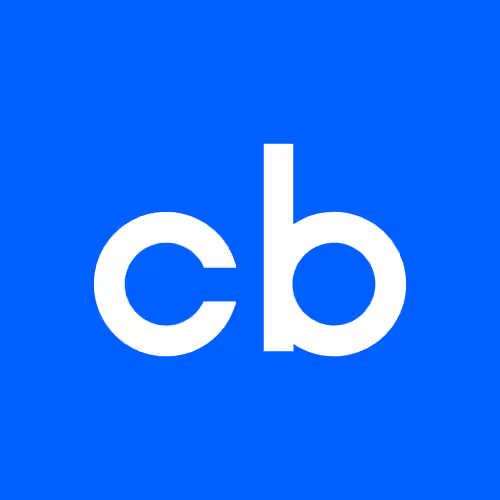Top 12 Enterprise Sales Software for 2026
Explore the best enterprise sales software tools, including 11x, Salesforce, and Clari, to scale revenue with AI, automation, and predictive insights.
Enterprise sales cycles are growing more complex while buyer expectations accelerate. Modern revenue teams manage larger deal sizes, longer evaluation periods, and multiple stakeholders across global markets. Traditional CRM platforms and point solutions can't match the orchestration demands of enterprise selling.
Today's enterprise sales software goes beyond contact management. It combines AI-powered forecasting, real-time conversation intelligence, automated workflows, and predictive analytics in unified platforms designed for scale. These systems deliver measurable outcomes: shortened sales cycles, improved win rates, and enhanced team performance across complex B2B environments.
How We Evaluate Enterprise Sales Software
Our methodology prioritizes neutral, criteria-driven analysis: 90% objective feature comparisons, 10% strategic insights from GTM experience. Tools are evaluated on enterprise readiness, integration depth, AI sophistication, coverage across the sales lifecycle, CRM quality, governance capabilities, and measurable ROI.
We assess each platform's ability to handle complex sales processes, multi-stakeholder deals, and enterprise-grade security requirements. Pricing transparency, onboarding quality, and scalability factor heavily into our recommendations. This evaluation framework ensures enterprise sales teams can make informed decisions based on functional capabilities rather than marketing promises.
Enterprise Sales Software Feature Comparison
The 12 Best Enterprise Sales Software Tools
1. 11x
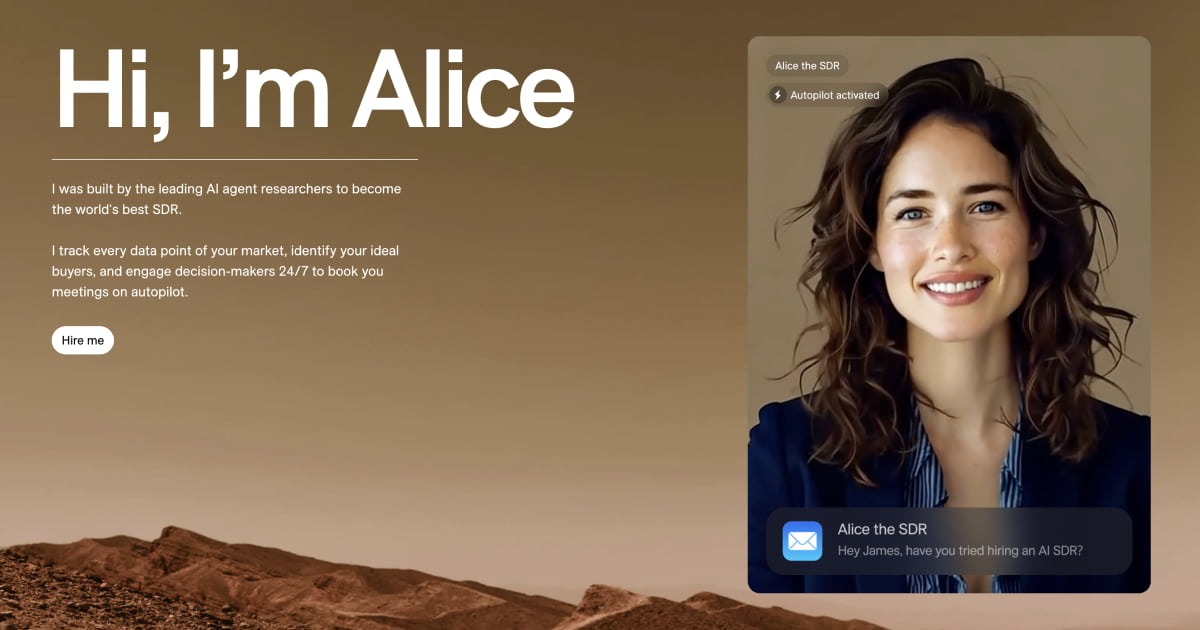
11x provides autonomous AI agents that manage the entire outbound sales process. Alice, the AI SDR, uses deep research capabilities on LinkedIn and other social media platforms to identify best-fit prospects. She then executes personalized, multichannel outreach campaigns to book qualified meetings 24/7. This system is designed to replace a fragmented tech stack with a single, automated execution layer.
11x is built for enterprises that cannot compromise on security or compliance. SOC 2 Type II, GDPR, CASA Tier 3, and CCPA certifications come standard, backed by white-glove onboarding, a dedicated customer success manager, and always-on Slack support. The platform operates with proprietary mailbox management and deliverability infrastructure to maximize conversions.
For deeper context on how autonomous response speed drives conversion, see Speed to Lead, and how 11x’s real‑time data infrastructure supports full‑cycle automation in Automated Lead Generation.
- Key Features: Alice identifies high-intent leads, automates personalized outreach on LinkedIn and email, and syncs all activity with your CRM. Julian, the AI phone agent, can handle inbound qualification and follow-up calls. Both digital workers learn from engagement data to optimize campaigns continuously.
- Pros: Autonomous multi‑channel execution; real‑time signal monitoring; enterprise‑grade compliance; 24/7 scalability.
- Cons: Requires workflow integration readiness; not designed for one‑off data exports.
- Best Fit: Mid-market and enterprise B2B sales teams aiming to scale high-quality lead generation and automate repetitive tasks. Unlike traditional platforms requiring constant oversight, 11x functions as autonomous digital workers that operate 24/7. Learn more about Alice and Julian.
- Pricing: Custom pricing based on business size and automation scope; enterprise and growth plans available on request.
2. Salesforce Sales Cloud
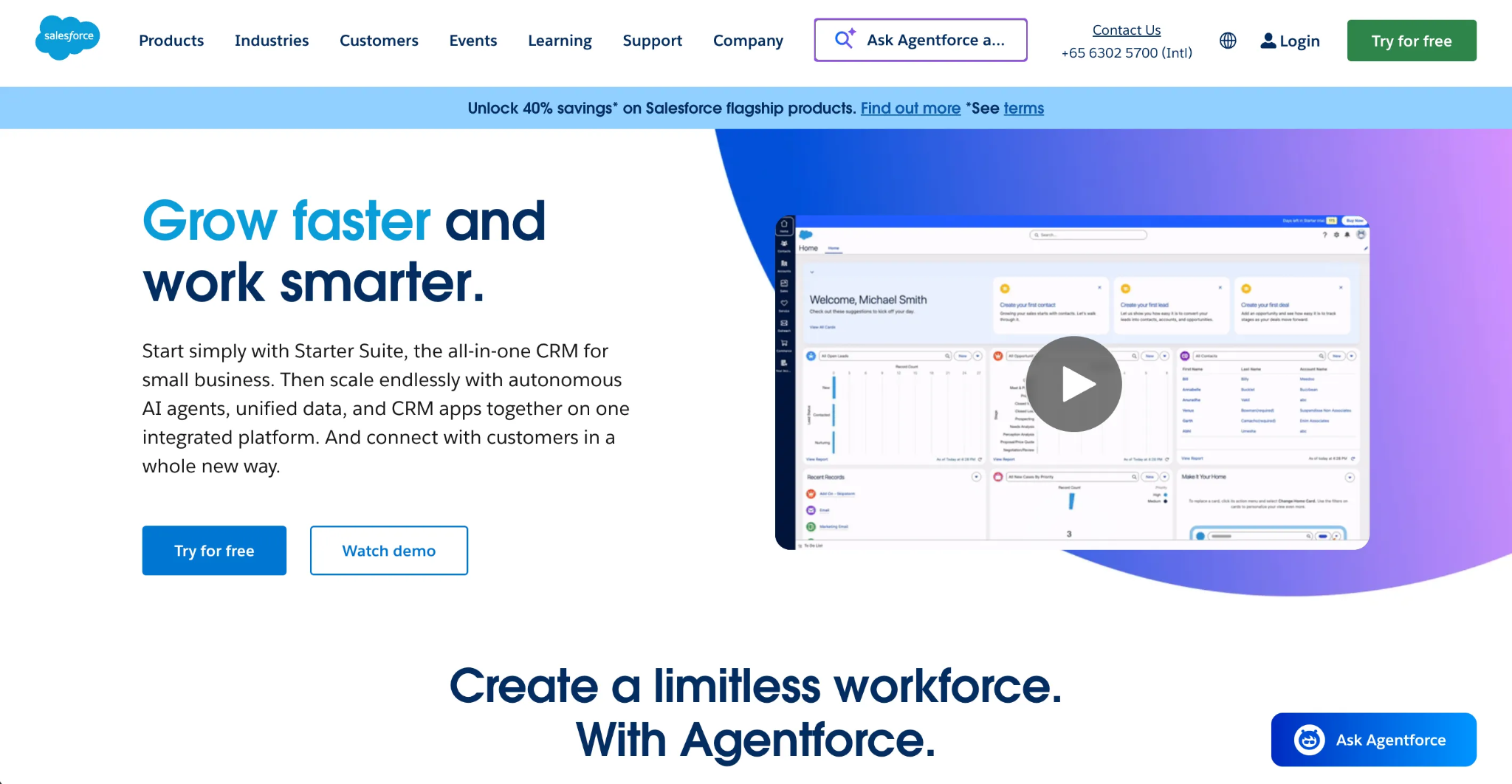
Salesforce Sales Cloud connects forecasting, automation, and deal management in one environment designed for complex enterprise sales cycles. The platform handles multiple stakeholders, lengthy evaluation periods, and sophisticated approval workflows that characterize enterprise deals. Customizable dashboards track performance across territories while predictive deal scoring identifies at-risk opportunities before they stall.
Enterprise features include advanced territory management, collaborative forecasting, and approval processes that scale across global sales organizations. The platform integrates with ERP systems, marketing automation platforms, and business intelligence tools through its extensive AppExchange ecosystem.
- Key Features: Territory and quota management, collaborative forecasting, opportunity scoring, workflow automation, and comprehensive reporting. Einstein AI provides predictive insights for deal health and next best actions.
- Pros: Powerful customization; deep ecosystem integration; robust pipeline forecasting; scalable enterprise governance.
- Cons: High administrative overhead; requires specialized implementation support.
- Best Fit: Large-scale enterprise sales teams managing long sales cycles with multiple decision-makers. Salesforce excels at customization and integration depth, while 11x automates the prospecting and outreach that feeds these complex pipelines.
- Pricing: Enterprise edition ~$165 per user/month; Unlimited edition ~$330 per user/month (exclusive of implementation and support).
3. HubSpot Sales Hub
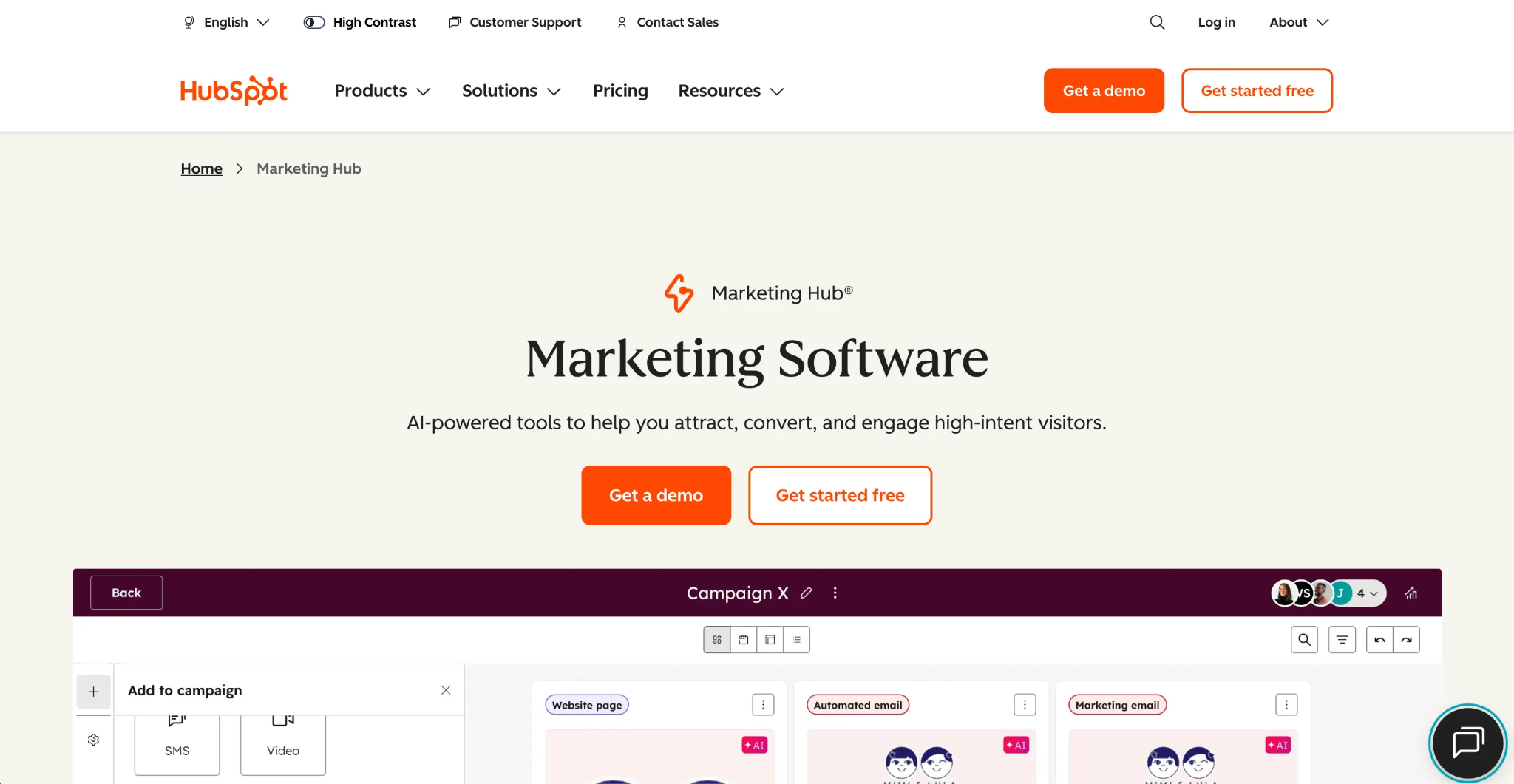
HubSpot Sales Hub coordinates marketing and sales activities within an intuitive interface built for rapid deployment and team adoption. The platform combines CRM functionality with automated sequences, email tracking, and meeting scheduling. Visual workflow builders enable complex nurture campaigns without technical expertise while maintaining alignment between marketing and sales teams.
Enterprise tiers include advanced reporting, custom objects, and team management features. The platform's strength lies in its unified approach to customer data, ensuring consistent experiences from first touch through customer success.
- Key Features: Contact and deal management; automated sequences; meeting scheduling; AI‑powered content assistance; unified analytics across CRM and marketing data.
- Pros: Fast implementation; intuitive interface; strong marketing alignment; broad integration ecosystem.
- Cons: Limited forecasting depth; enterprise features gated to high‑tier plans.
- Best Fit: Growing businesses transitioning from SMB to enterprise sales, teams prioritizing ease of use and marketing-sales alignment. HubSpot provides excellent workflow management, whereas 11x delivers autonomous prospecting that requires no manual sequence management.
- Pricing: Professional ~$90 per seat/month; Enterprise ~$150 per seat/month (annual billing).
4. Gong
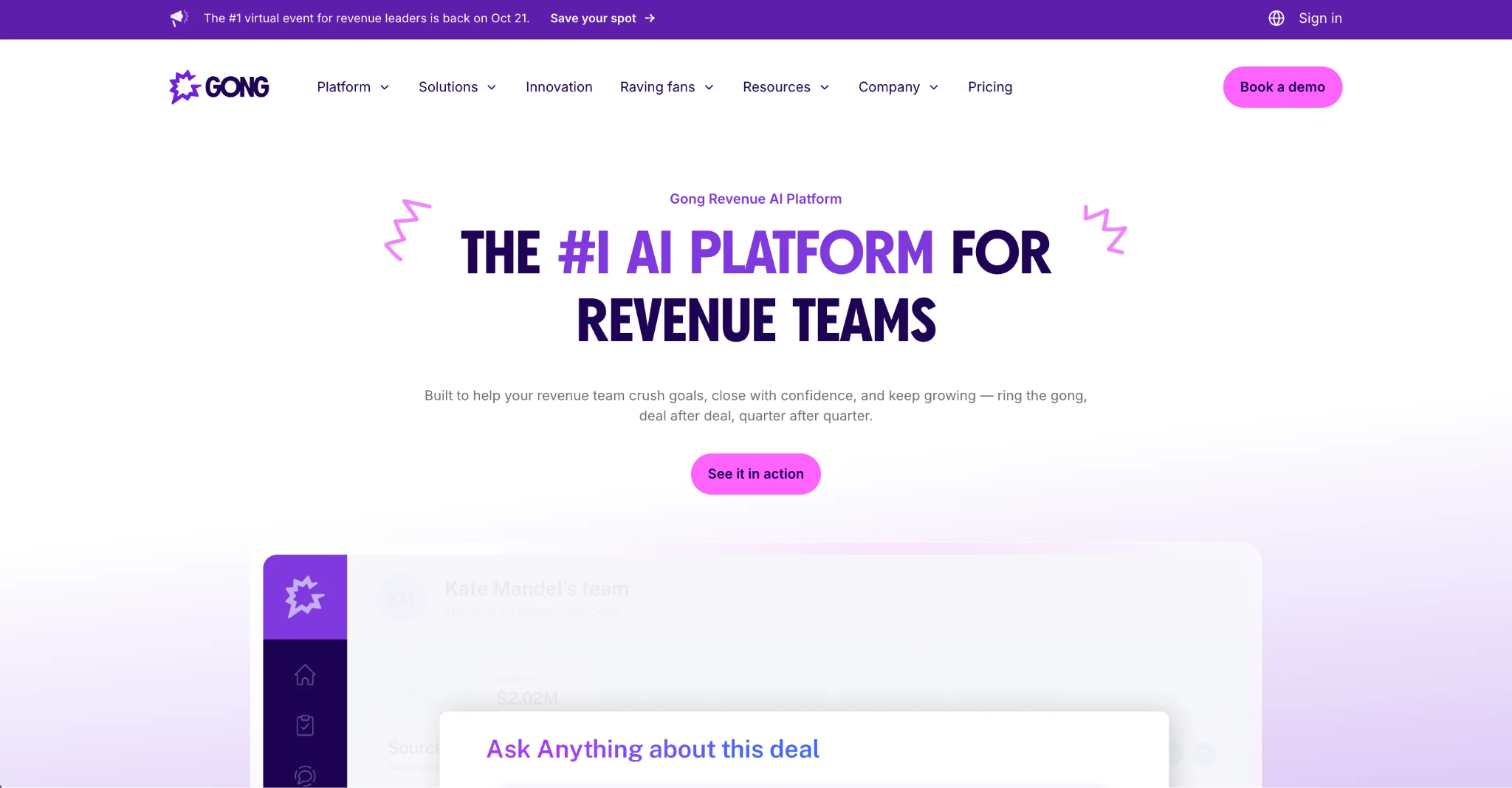
Gong analyzes every sales conversation to provide AI-driven insights into deal health, competitive mentions, and coaching opportunities. The platform transcribes and analyzes calls, emails, and web conferences to identify patterns that correlate with closed deals. Revenue intelligence capabilities extend beyond individual calls to provide team-wide insights and forecasting accuracy.
Enterprise features include custom topic tracking, advanced analytics, and integration with major CRM platforms. The system identifies which messaging resonates with prospects, tracks competitor mentions, and surfaces coaching moments for sales leaders.
- Key Features: Conversation transcription; deal health scoring; competitive‑mention tracking; rep coaching; forecasting analytics.
- Pros: Exceptional conversation analytics; predictive deal insights; enterprise‑grade reliability.
- Cons: Premium pricing; requires consistent call volume for maximum ROI.
- Best Fit: Enterprise teams focused on performance optimization and data‑driven coaching.
- Pricing: Starts ~$1,200 per user/year; enterprise packages ~$2,000–$2,500 per user/year.
5. Outreach
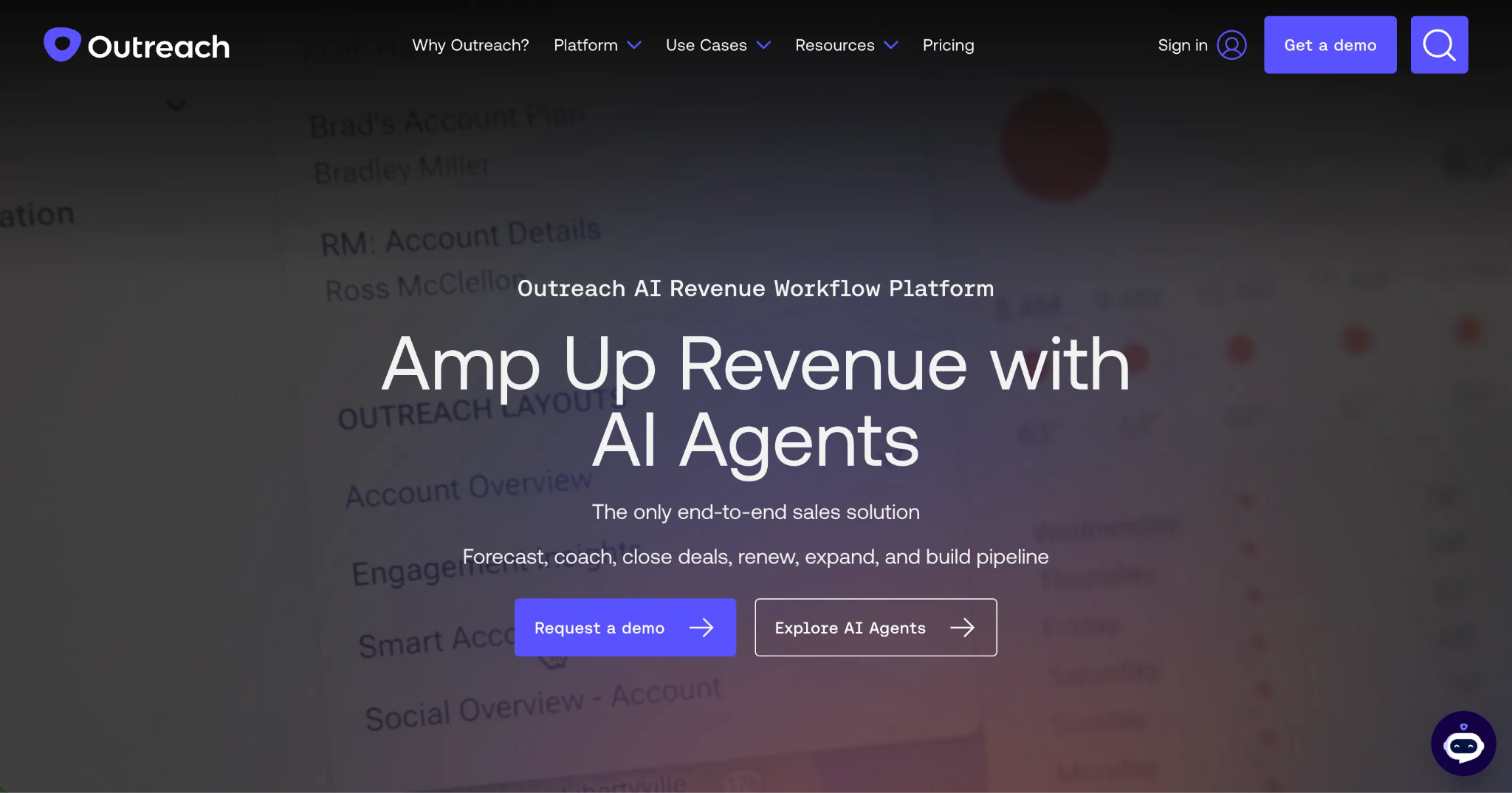
Outreach automates personalized communication across email, phone, LinkedIn, and other channels through sophisticated sequencing logic. The platform enables complex, multi-touch campaigns that adapt based on prospect engagement while maintaining deliverability through built-in reputation management. Advanced personalization capabilities scale human-like communication without sacrificing quality.
Enterprise capabilities include team collaboration features, advanced reporting, and integration with conversation intelligence platforms. The system tracks engagement across all touchpoints while providing insights into which sequences drive the highest conversion rates.
- Key Features: Multi‑channel sequencing; AI‑based activity recommendations; engagement scoring; reputation management.
- Pros: Comprehensive automation; flexible sequence logic; robust reporting; high deliverability.
- Cons: Steep learning curve; premium cost for large deployments.
- Best Fit: Enterprise sales teams coordinating complex, outbound engagement across multiple stakeholders.
- Pricing: ~$140–$160 per user/month on annual contract; enterprise suites $20k–$60k per year.
6. Clari
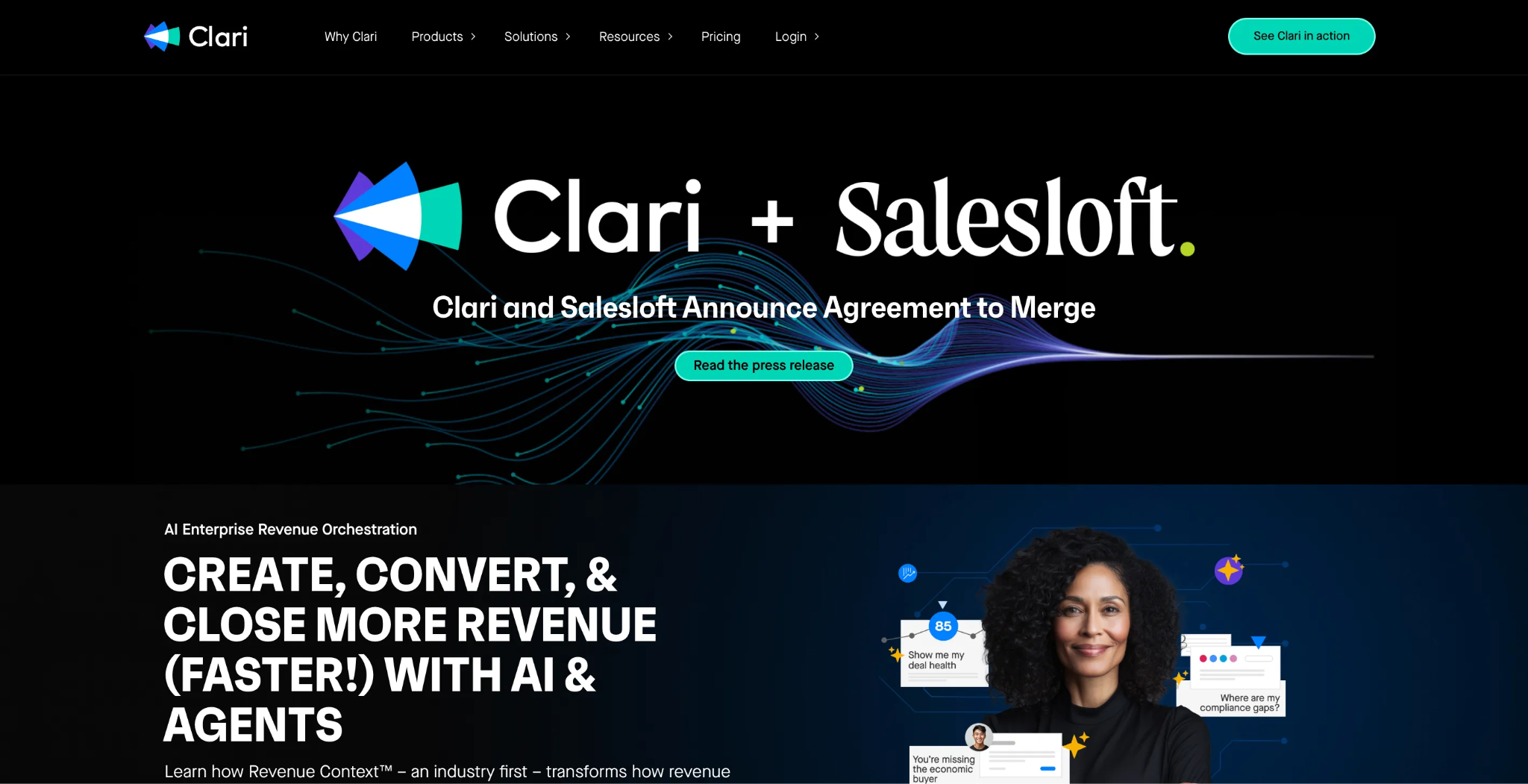
Clari provides predictive revenue intelligence through AI-powered analysis of CRM data, email patterns, and meeting cadence. The platform identifies deal risks before they impact forecasts while providing visibility into pipeline health across territories and time periods. Revenue operations teams use Clari to improve forecasting accuracy and identify process improvements.
Advanced analytics surface insights about deal velocity, win/loss patterns, and rep performance. The platform integrates with major CRMs to analyze existing data without requiring process changes.
- Key Features: Predictive forecasting; pipeline management; revenue analytics; risk detection; AI‑driven insights.
- Pros: High forecasting accuracy; clear visibility across territories; purpose‑built for RevOps.
- Cons: Analysis‑heavy; requires significant data volume; no outbound execution features.
- Best Fit: Revenue operations leaders requiring accurate forecasting and pipeline visibility. Clari analyzes pipeline health, while 11x generates the pipeline through autonomous prospecting and qualification.
- Pricing: Custom enterprise contracts starting ~$60k annually; scales to $100k+ for global teams.
7. Microsoft Dynamics 365 Sales
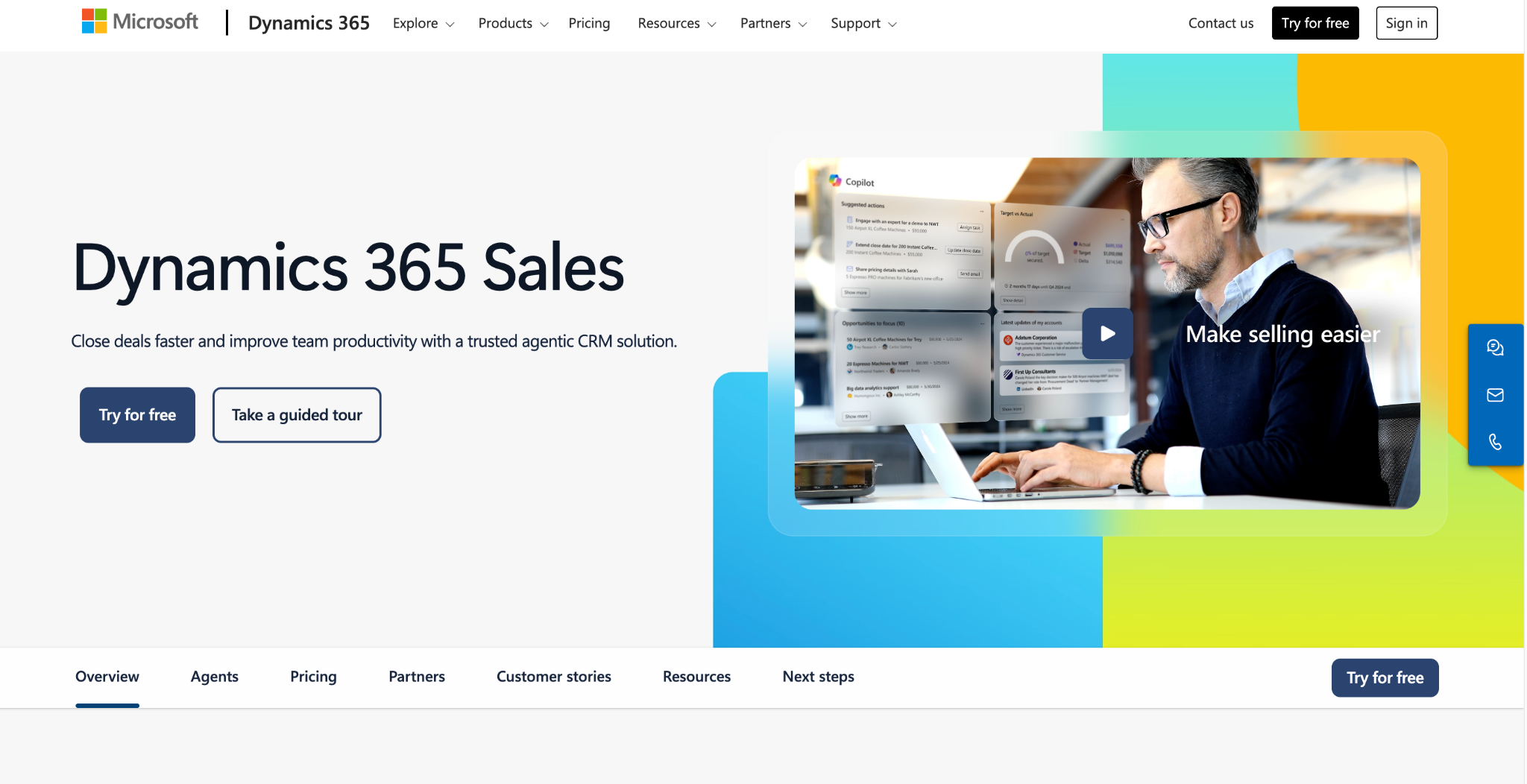
Microsoft Dynamics 365 Sales integrates deeply with the Microsoft ecosystem while providing enterprise CRM functionality. The platform connects with Office 365, Teams, and Power BI to create unified workflows that leverage existing infrastructure investments. ERP integration capabilities distinguish it from pure-play CRM solutions by connecting sales data with financial and operational systems.
AI insights powered by Microsoft's infrastructure provide predictive analytics while maintaining data security within familiar Microsoft environments. The platform supports complex approval workflows, territory management, and global deployment scenarios.
- Key Features: ERP integration; CRM management; AI insights; Power BI analytics; Teams collaboration.
- Pros: Tight Microsoft ecosystem integration; robust security; scalable global support.
- Cons: Interface complexity; best performance inside Microsoft environments only.
- Best Fit: Enterprise organizations already operating in Microsoft’s ecosystem and requiring ERP alignment.
- Pricing: Professional ~$65 per user/month; Enterprise ~$150 per user/month; AI add‑ons up to $190 per user.
8. Apollo.io
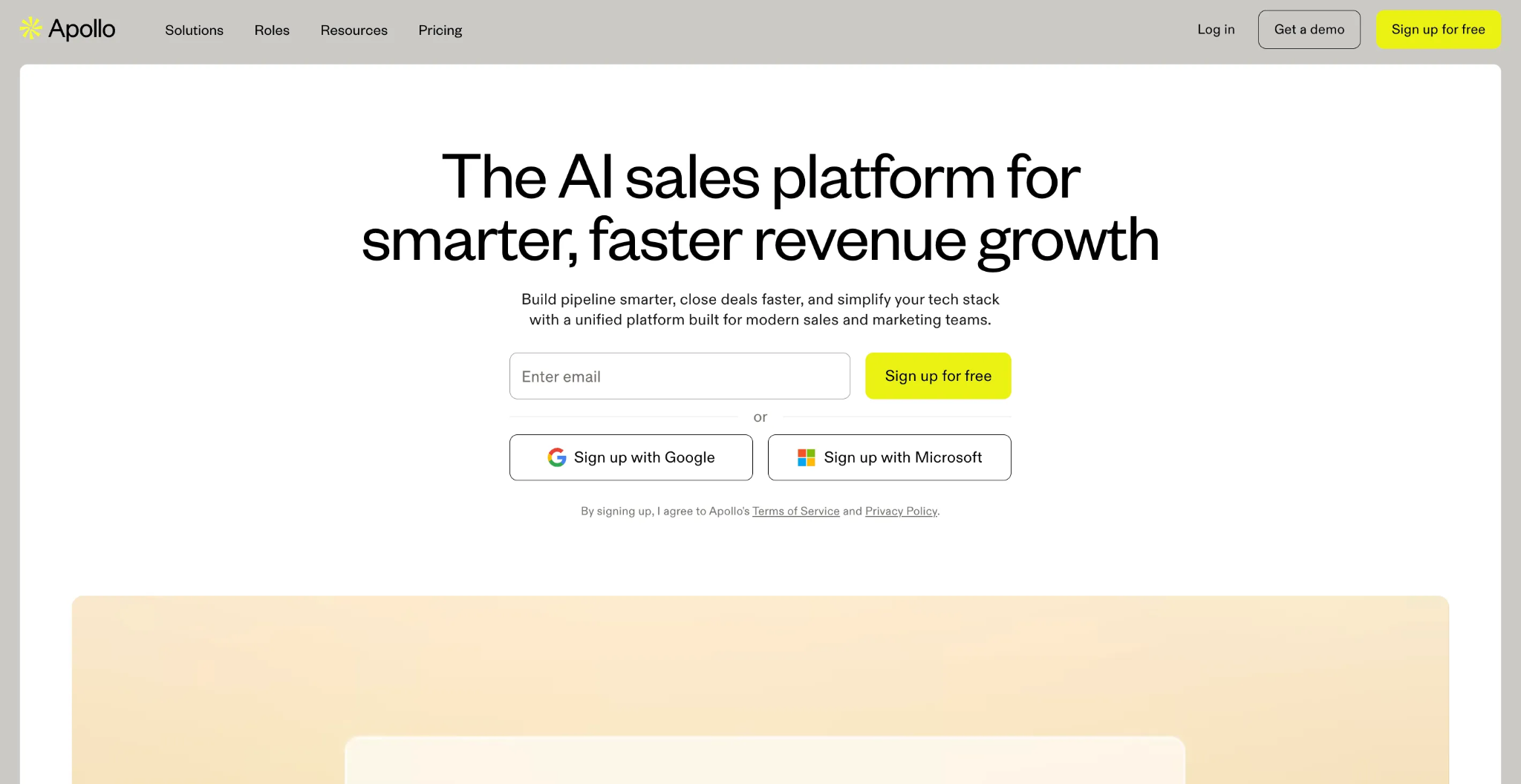
Apollo.io combines a database of 210+ million contacts with automated outreach capabilities, reducing tool stack complexity for enterprise sales teams. The platform uses AI to identify high-intent prospects while providing verified contact information and company intelligence. Built-in call recording and meeting scheduling streamline the entire sales process within one interface.
Waterfall enrichment ensures maximum data coverage by checking multiple sources automatically. The platform tracks engagement across email, calls, and social touches while providing unified reporting on conversion drivers.
- Key Features: Verified 210 M+ contacts; enrichment workflows; AI‑powered lead scoring; sequence automation; CRM sync.
- Pros: Extensive B2B data coverage; built‑in enrichment; affordable entry pricing.
- Cons: Data quality varies by region; limited automation depth for enterprise use.
- Best Fit: Outbound teams focused on rapid list building and high‑volume outreach efficiency.
- Pricing: Professional $59 per user/month; Organization $99; custom enterprise ~$120–$150 per user/month.
9. Pipedrive
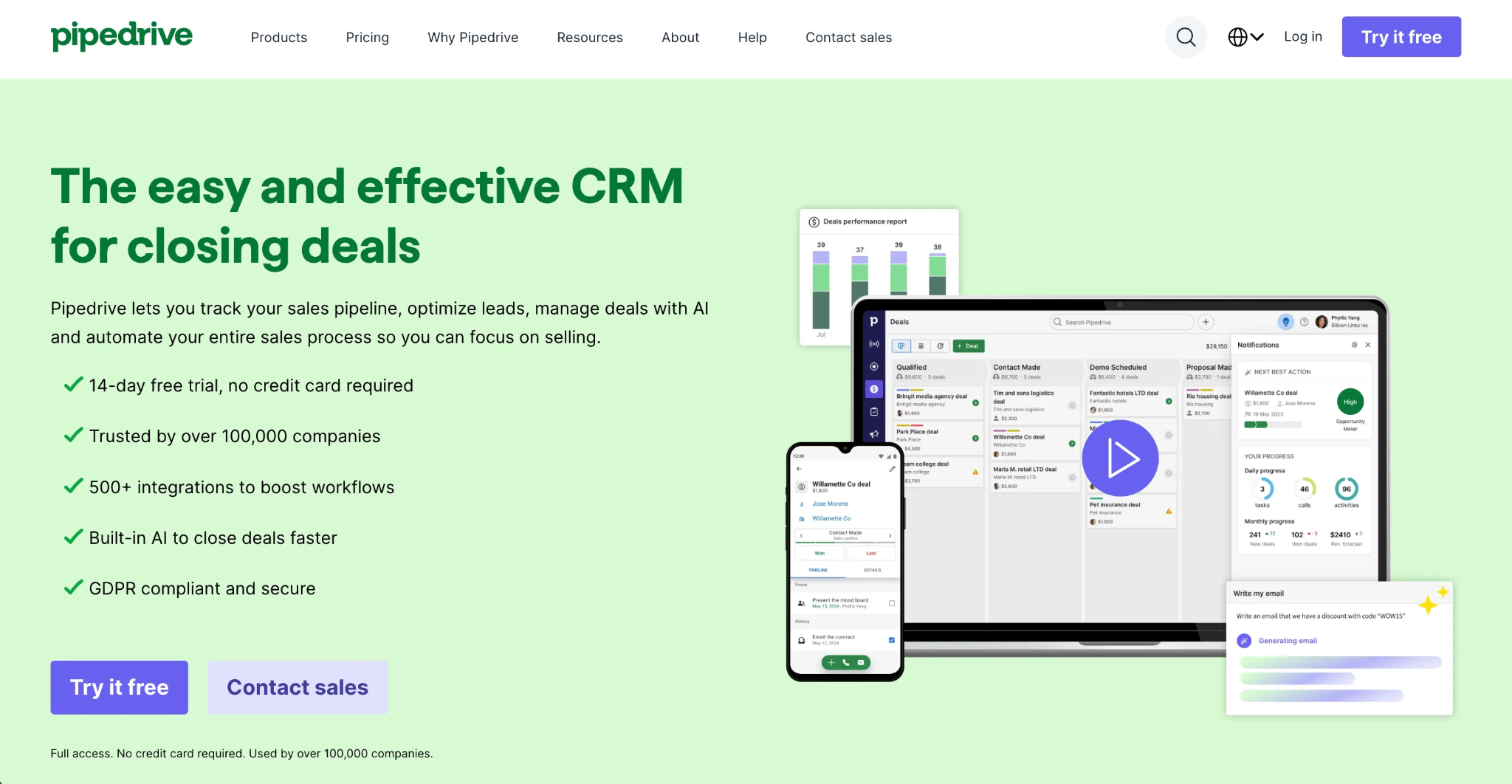
Pipedrive provides visual pipeline management optimized for deal tracking and team performance monitoring. The platform's strength lies in its intuitive interface and clear opportunity progression tracking. Workflow automation handles routine tasks while maintaining focus on deal advancement and closing activities.
Enterprise features include advanced reporting, team management capabilities, and integration with popular business tools. The visual approach helps sales leaders quickly identify bottlenecks and coaching opportunities.
- Key Features: Visual CRM pipelines; automated task workflows; reporting dashboards; collaboration features.
- Pros: Fast onboarding; intuitive UI; strong for deal progression; affordable pricing tiers.
- Cons: Limited scalability for complex enterprise logic; basic forecasting.
- Best Fit: Mid‑market sales teams prioritizing ease of use and clarity in managing active deals.
- Pricing: $24–$119 per user/month depending on tier; enterprise setups ~$1,200 per seat annually.
10. Salesloft
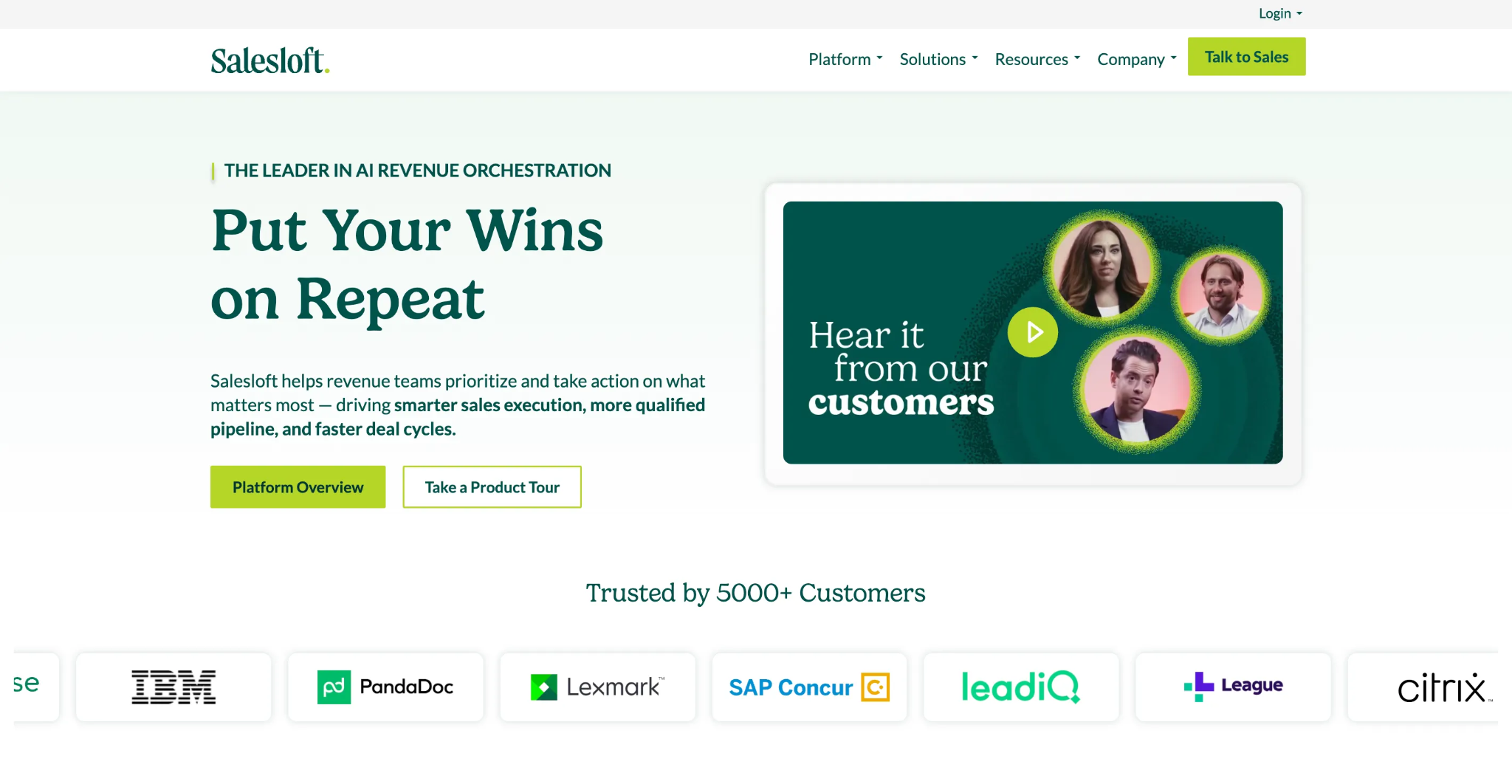
Salesloft provides enterprise-level sales engagement through AI-powered conversation intelligence and multichannel automation. The platform analyzes sales conversations to provide coaching insights while automating personalized outreach sequences. Advanced analytics identify which activities drive the highest conversion rates across different buyer personas.
The system integrates conversation intelligence with engagement automation to provide comprehensive visibility into sales activities. Teams can optimize their approach based on successful interaction patterns.
- Key Features: Conversation intelligence; sequence automation; performance dashboards; CRM integrations.
- Pros: High‑quality analytics; AI coaching capabilities; personalized engagement logic.
- Cons: Premium cost structure; requires training for advanced configuration.
- Best Fit: Enterprise AEs and team managers improving consistency and coaching visibility across outreach efforts.
- Pricing: Typical range $125–$175 per user/month (annual contract).
11. VanillaSoft
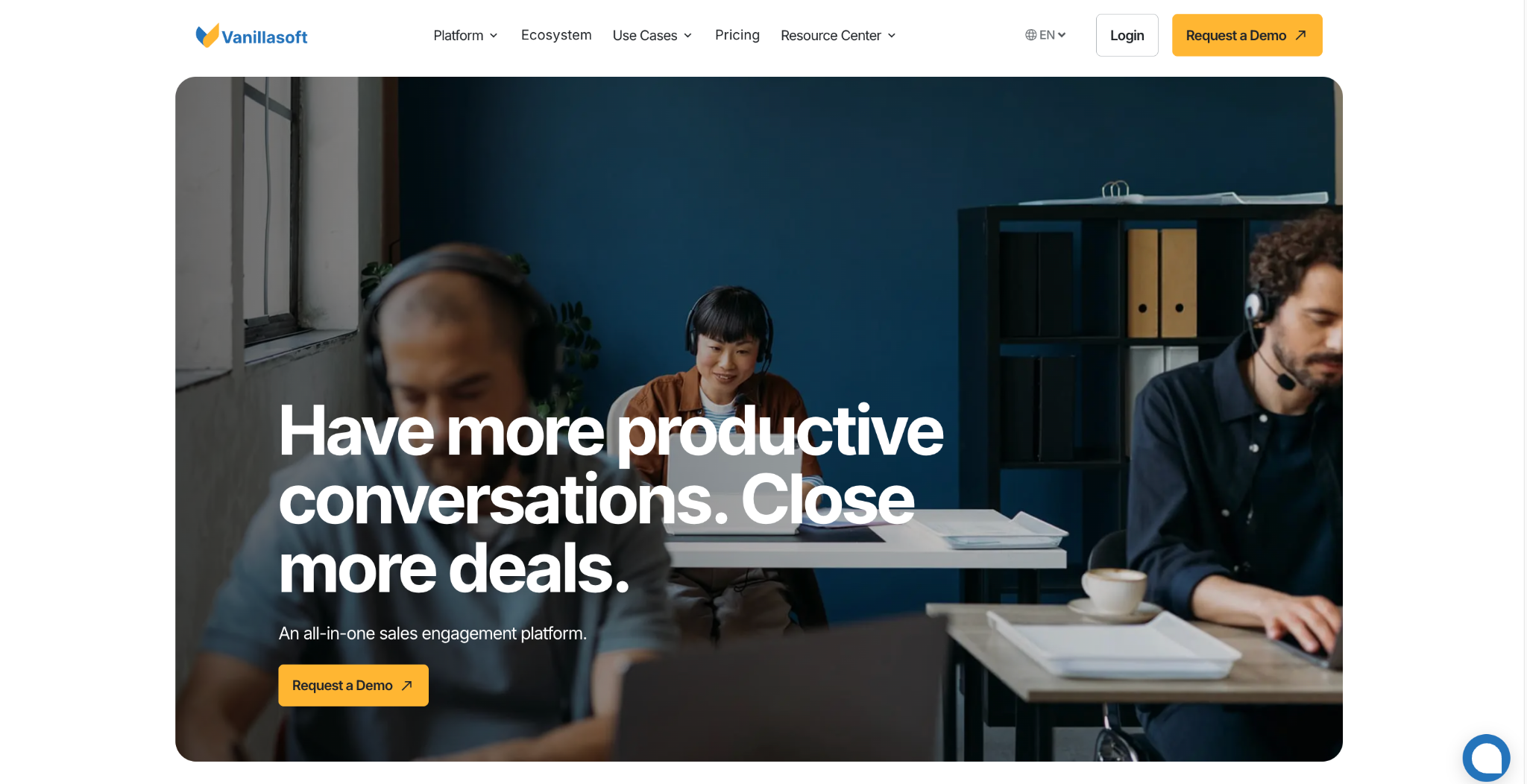
VanillaSoft automates high-volume inside sales through queue-based lead routing and performance optimization. The platform excels at managing consistent follow-up processes and lead prioritization for teams handling large volumes of prospects. Real-time metrics provide visibility into team performance and conversion rates.
Queue-based routing ensures leads receive timely attention while automated workflows handle routine follow-up tasks. The system tracks performance metrics that help sales leaders optimize processes.
- Key Features: Queue routing; workflow automation; performance dashboards; lead scoring; team tracking.
- Pros: Excellent for high‑volume inbound or outbound call flows; strong reporting; rep productivity visibility.
- Cons: Limited flexibility for complex enterprise workflows; narrow feature scope.
- Best Fit: Inside‑sales and business‑development teams managing repetitive outreach at scale.
- Pricing: ~$80–$155 per user/month , depending on feature depth and integrations.
12. Freshsales
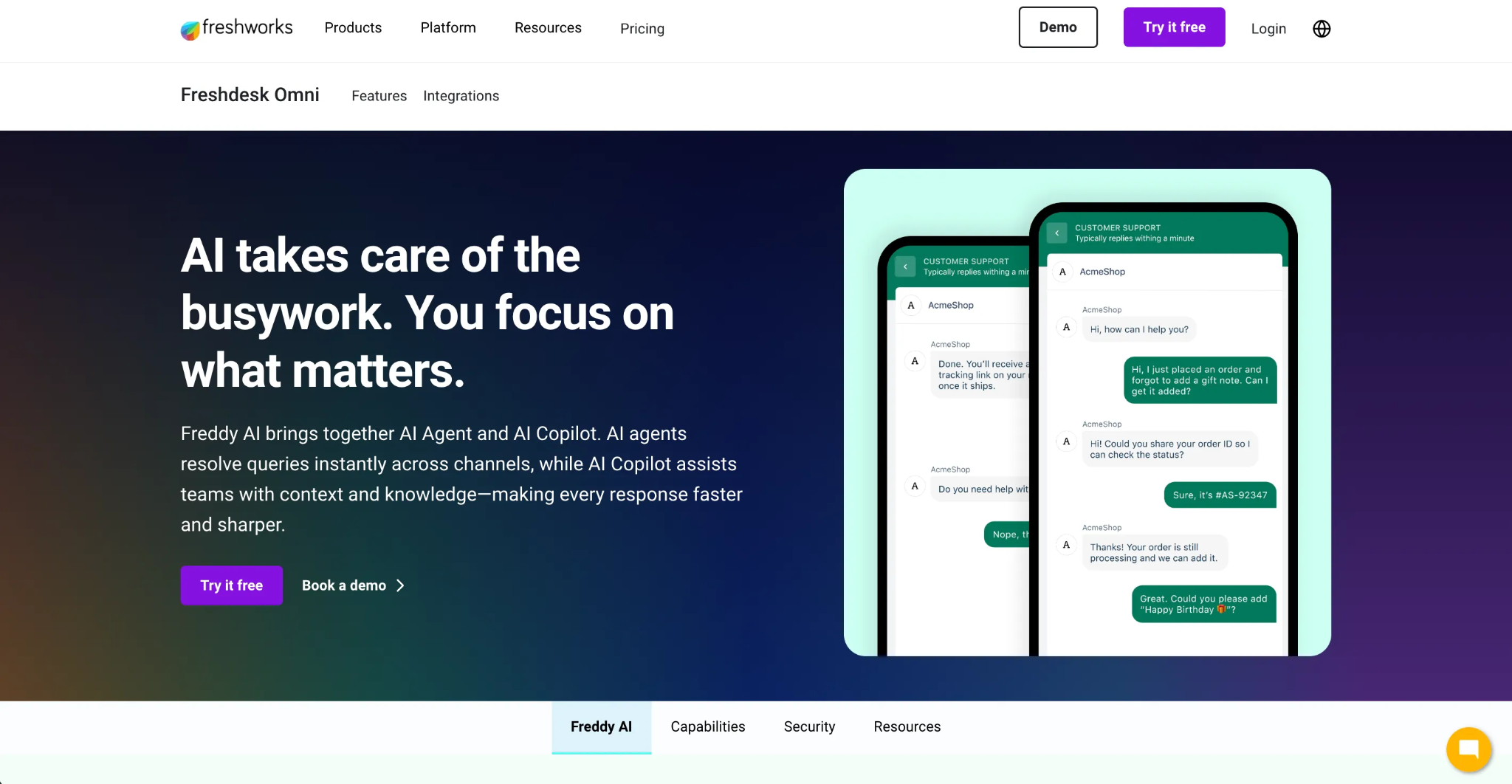
Freshsales provides AI-powered pipeline management for enterprise companies seeking unified customer interaction tracking. The platform combines traditional CRM functionality with predictive analytics and omnichannel communication capabilities. Built-in phone, email, and chat tools reduce the need for separate communication platforms.
AI-driven insights help prioritize leads and predict deal outcomes while workflow automation handles routine tasks. The platform supports complex business processes through custom fields and approval workflows.
- Key Features: Omnichannel CRM; predictive lead scoring; built‑in communication suite; workflow automation.
- Pros: Unified platform; AI prioritization; easy interface; strong customer support.
- Cons: Smaller ecosystem; limited advanced analytics.
- Best Fit: B2B SaaS and mid-enterprise companies consolidating customer interactions. Freshsales provides solid CRM functionality, while 11x delivers autonomous prospecting that requires no manual lead management.
- Pricing: Growth $18 per user/month; Pro $47; Enterprise $83; average annual cost $1,000–$1,500 per seat.
How Enterprise Sales Teams Use These Tools in Practice
Enterprise sales software supports every stage of the revenue cycle, from the very first prospecting outreach to deal closure and ongoing customer success. Rather than operating in silos, revenue teams use these platforms to align account executives, decision-makers, and RevOps around shared data and consistent, repeatable processes.
This alignment is further strengthened by automation and predictive insights, which reduce manual work and prevent missed opportunities. By automatically triggering actions based on buyer behavior and engagement patterns, these tools ensure that every prospect receives timely, relevant outreach. As a result, sales reps can devote their energy to high-value activities like relationship building and negotiation, while routine tasks such as data entry, follow-ups, and lead qualification happen seamlessly in the background.
The impact of this shift becomes measurable through real-time performance dashboards and analytics. These analytics track key metrics such as forecasting accuracy, win rates, and speed to lead, which makes performance improvements easy to measure. With this visibility, teams can quickly identify bottlenecks, refine their approaches, and make smarter decisions based on evidence rather than intuition.
In essence, enterprise sales software doesn’t just streamline workflows. It connects people, processes, and insights into a single, data-driven engine for sustained growth.
Decision Criteria for Choosing Enterprise Sales Software
Selecting the right enterprise sales platform requires careful alignment between organizational needs, infrastructure, and long-term growth goals.
- Capability mapping: Match platform features to team pain points and existing CRM architecture to ensure the best organizational fit.
- Core differentiators: Evaluate solutions based on security, scalability, and AI functionality — key factors distinguishing enterprise-grade tools from SMB-focused alternatives.
- Integration planning: Ensure seamless connections with existing tools like Slack, LinkedIn, and ERP systems across ecosystems (e.g., Microsoft or Salesforce) to preserve data integrity and minimize adoption friction.
- Success indicators: Track onboarding satisfaction, forecasting accuracy improvements, and team engagement as leading measures of implementation success.
- User-centered outcomes: Prioritize user experience and measurable business results over extensive feature lists to maximize long-term ROI.
The Future of Enterprise Sales Software
Enterprise sales is entering a stage defined by AI‑driven autonomy, compliance, and measurable revenue outcomes. Top teams no longer manage scattered tools; they run cohesive, intelligent systems that unify forecasting, communication, and engagement.
11x leads this shift by replacing manual execution with autonomous performance. Its digital workers operate securely under SOC 2 Type II, GDPR, CASA Tier 3, and CCPA frameworks, learning continuously and engaging prospects at scale without supervision.
The result is a new standard for enterprise sales software: compliant, continuous, and outcome‑driven.
Book a demo to see how 11x’s AI agents Alice and Julian transform enterprise outreach and convert the pipeline into predictable revenue.
Frequently Asked Questions
Enterprise sales software combines multiple capabilities like conversation intelligence, predictive forecasting, and advanced automation in unified platforms designed for complex B2B sales cycles. These systems handle longer evaluation periods, multiple decision-makers, and large deal sizes where standard CRMs fall short. They’re purpose-built to manage high-value workflows, real-time data synchronization, and scalable governance requirements. 11x extends beyond this baseline by introducing autonomous execution—digital workers that handle outreach, qualification, and follow-ups without manual input, closing the operational gap between insight and action.
Automation eliminates repetitive processes that slow down enterprise sales teams, such as manual lead routing, data entry, and repetitive follow-up sequences. By connecting CRM data with AI agents, systems can trigger outreach the moment buyer activity signals intent. This increases conversion rates and reduces sales cycle duration. At 11x, automation is executed entirely through AI agents like Alice and Julian, who run campaigns, qualify leads, and hand off meetings directly to account executives, all in real time.
Scalability hinges on integration. The most critical integrations include CRM systems like Salesforce and HubSpot, communication tools like Slack and LinkedIn, and ERP platforms for financial visibility. Seamless integration allows sales intelligence, forecasting metrics, and engagement data to flow across the organization automatically. 11x deepens this interoperability by syncing directly with your CRM and outreach stack, maintaining full data continuity while its AI workers handle execution.
Platforms such as Outreach and Salesloft provide powerful automation for structured sequences, but they still rely on ongoing human oversight. 11x represents the next step, AI digital workers that autonomously research leads, personalize messaging, and adapt to engagement signals across LinkedIn, email, and phone. For teams scaling outbound while keeping deliverability and compliance intact, 11x transforms AI outreach from a software tool into a self‑running growth engine.


